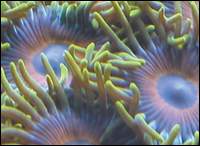 Getting started in keeping marine fish and invertebrates can be a very daunting task, especially if you are discoursed from doing so by misinformation. Many shops and individuals initially tell new hobbyists that keeping a successful marine tank, especially one containing corals and other invertebrates as well as fish, is impossible and they should not even try. This may have been the case twenty years ago, but fortunately, in the past decade or so, keeping marine invertebrates and fish successfully over the long term has become much easier. In addition, as long as a few things are done before getting started in the hobby, the chances for success are greatly increased as well.The first step is to read as much as possible. There are now several good introductory books on the market including The New Marine Aquarium and The Conscientious Aquarist that lay out everything a new hobbyist needs to do and plan for in order to achieve success.These books provide an excellent framework from which to start.The rules and general design laid out in these books should be followed by anyone getting started in the hobby. One of the ways by which new hobbyists get into trouble is by listening to too many sources of information and then try to incorporate all of these different opinions into their system. It is much better to follow a relatively simple plan to start and then, as success comes, add to it.
Getting started in keeping marine fish and invertebrates can be a very daunting task, especially if you are discoursed from doing so by misinformation. Many shops and individuals initially tell new hobbyists that keeping a successful marine tank, especially one containing corals and other invertebrates as well as fish, is impossible and they should not even try. This may have been the case twenty years ago, but fortunately, in the past decade or so, keeping marine invertebrates and fish successfully over the long term has become much easier. In addition, as long as a few things are done before getting started in the hobby, the chances for success are greatly increased as well.The first step is to read as much as possible. There are now several good introductory books on the market including The New Marine Aquarium and The Conscientious Aquarist that lay out everything a new hobbyist needs to do and plan for in order to achieve success.These books provide an excellent framework from which to start.The rules and general design laid out in these books should be followed by anyone getting started in the hobby. One of the ways by which new hobbyists get into trouble is by listening to too many sources of information and then try to incorporate all of these different opinions into their system. It is much better to follow a relatively simple plan to start and then, as success comes, add to it.In this regard it is also a good idea to try and find a mentor to help you along the way.This can be someone whose tank you have seen, someone you have met on the internet, or even someone whose work you have read. Most advanced hobbyists are willing to help new hobbyists as long as the new hobbyist shows a willingness to learn and put the time into being successful. In terms of time, this is one of the other crucial aspects of reefkeeping that needs to be fully understood if success is to be achieved. First, the initial set up, curing and establishment of the tank is going to take time. So plan on spending a fair amount of time getting your tank established. Fortunately once a tank is set up successfully it really does not take that much time to maintain it.The other aspect of time that needs to be taken into account is that patience is absolutely essential in order to be successful.A number of years ago I made the statement that nothing good ever happens fast in a reef tank, only bad things happen fast. By this I mean that a tank will not be fully established with fullgrown corals, a complete fish population and perfectly working equipment overnight. It will take at least a year for a tank to really be fully established.
 Even then, a tank will still be in its infancy. The basic principles behind the establishment of a successful reef tank are actually quite simple: good water quality, proper lighting, strong water motion, and proper stocking.There are myriad ways to achieve these conditions, with no single way being perfect. For this reason there are many ways to set up a tank and be successful.The crucial thing is to find a methodology that is successful and follow it.Also, most successful hobbyists are meticulous in terms of knowing the details of their tank and in following up quickly when things start to go even a little wrong. Patience and attention to detail are what separate very successful hobbyists from those that have constant problems so keep this in mind. Cost is also not necessarily the determining factor for success or failure. Setting up a reef tank is relatively expensive. However when done properly, over the long term the cost is manageable as it should not be necessary to have to replace fish, coral or live rock in that in a stable successful system these inhabitants can live happily for decades. Right now reef tanks are the fastest growing segment of fishkeeping so this in itself should be evidence that things are getting easier and people are more successful in this hobby than ever.
Even then, a tank will still be in its infancy. The basic principles behind the establishment of a successful reef tank are actually quite simple: good water quality, proper lighting, strong water motion, and proper stocking.There are myriad ways to achieve these conditions, with no single way being perfect. For this reason there are many ways to set up a tank and be successful.The crucial thing is to find a methodology that is successful and follow it.Also, most successful hobbyists are meticulous in terms of knowing the details of their tank and in following up quickly when things start to go even a little wrong. Patience and attention to detail are what separate very successful hobbyists from those that have constant problems so keep this in mind. Cost is also not necessarily the determining factor for success or failure. Setting up a reef tank is relatively expensive. However when done properly, over the long term the cost is manageable as it should not be necessary to have to replace fish, coral or live rock in that in a stable successful system these inhabitants can live happily for decades. Right now reef tanks are the fastest growing segment of fishkeeping so this in itself should be evidence that things are getting easier and people are more successful in this hobby than ever.Mike Paletta is the author of The New Marine Aquarium and Ultimate Marine Aquariums. He has been in the hobby for over 15 years and has written numerous articles for Aquarium Fish Magazine, Tropical Fish Hobbyist and Aquarium Frontiers.
Sierra Saltwater Systems is dedicated to providing the highest quality aquariums and services available. Locally owned and operated by professional aquarist Robert Ordway, Sierra Saltwater Systems works with designers, contractors and you to create beautiful marine environments for residential and commercial applications. An aquarium store on wheels, they offer healthy, net-caught livestock selected from around the world, hand picked and propagated corals, fresh food and supplements, top of the line dry goods and emergency service.
Visit the display aquarium at the Home Show Design Center, 780 Smithridge Drive, Ste. 300, Reno, NV, or call 530-386-1768
No comments:
Post a Comment